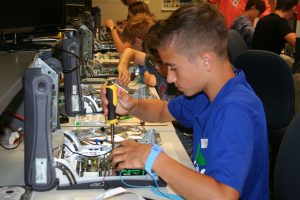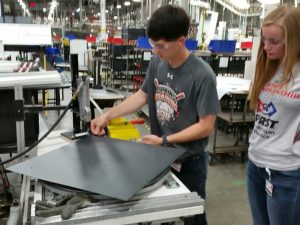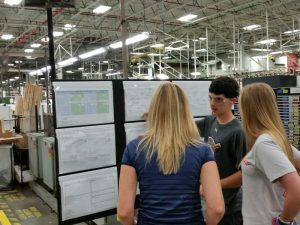 By Jennifer Owens, Lakeshore Advantage
By Jennifer Owens, Lakeshore Advantage
The Lakeshore region is driven by manufacturing. Nearly one quarter of the jobs in Ottawa County are manufacturing-based, which is almost three times higher than the national average. Many of these jobs require skills, certification and training beyond high school, but not necessarily a college degree. Yet, the average wage in manufacturing is significantly higher than the average income.
 As we found by interviewing 100 local company executives last year, 75 percent of these businesses plan to expand in the next three years. But more than half said there are barriers to growing here, citing the need to secure talent, particularly skilled trade workers and engineers, as their number-one issue.
As we found by interviewing 100 local company executives last year, 75 percent of these businesses plan to expand in the next three years. But more than half said there are barriers to growing here, citing the need to secure talent, particularly skilled trade workers and engineers, as their number-one issue.
Our current talent pipeline is not sustainable for our employers’ future growth. It takes actions, perception changes, investment and everyone working together to create a sustainable economic future for our employers and citizens. The good news is significant forward motion is occurring in our region.
 This year, 57 local companies will receive $2.4 million to train their workforce and help fill their talent gaps through the State of Michigan’s Skilled Trade Training fund. This funding, administered by West Michigan Works!, helps to provide transferable skills to new and existing employees in high demand careers like CNC machinists, welders, carpenters and electricians.
This year, 57 local companies will receive $2.4 million to train their workforce and help fill their talent gaps through the State of Michigan’s Skilled Trade Training fund. This funding, administered by West Michigan Works!, helps to provide transferable skills to new and existing employees in high demand careers like CNC machinists, welders, carpenters and electricians.
 Lakeshore Advantage and West Michigan Works! are bringing the “Hot Jobs” report and wage information to life for teachers by sharing skills, competencies and education levels needed for the most in-demand careers, along with what they pay. Last year, we shared this information with more than 300 teachers in the lakeshore region.
Lakeshore Advantage and West Michigan Works! are bringing the “Hot Jobs” report and wage information to life for teachers by sharing skills, competencies and education levels needed for the most in-demand careers, along with what they pay. Last year, we shared this information with more than 300 teachers in the lakeshore region.
These are great strides, but we have more work to do. Continued forward progress will take a strong partnership between our employers and school districts to ensure the incredible career exploration programs, like those offered at the Ottawa Intermediate Area School District Careerline Tech Center, are led by strong manufacturing mentors.
 Progress will also require a shift in the minds of parents to recognize that earning an advanced certification in a program like welding is just as significant and lucrative an accomplishment as earning a college degree. As parents, educators, peer students and citizens, we must recognize manufacturing and skilled trade jobs as fruitful career choices with potential and opportunity to thrive in our community and professionally.
Progress will also require a shift in the minds of parents to recognize that earning an advanced certification in a program like welding is just as significant and lucrative an accomplishment as earning a college degree. As parents, educators, peer students and citizens, we must recognize manufacturing and skilled trade jobs as fruitful career choices with potential and opportunity to thrive in our community and professionally.
A sustainable economic future is one in which individuals are successful as their interests match their education levels, skills and careers; in which our companies grow as their talent needs are met, and in which our region experiences a vibrant economy with great jobs now and in the future. For everyone.
Jennifer Owens has been president since 2013 of Lakeshore Advantage, a non-profit economic development organization that connects businesses to the resources they need to grow in Ottawa County, northern Allegan County and West Michigan.
![]() This Week’s Sustainability Framework Theme
This Week’s Sustainability Framework Theme
Economic Development: Businesses and the local consumers are driving engines that generate capital for growth and development. We want to be a location of choice for new business and industry.
![]() ABOUT THIS SERIES
ABOUT THIS SERIES
Living Sustainably is a collection of community voices sharing updates about local sustainability initiatives. It is presented by the Holland-Hope College Sustainability Institute, a joint project of Hope College, the City of Holland and Holland Board of Public Works. Go to www.hope.edu/sustainability-institute for more information.

